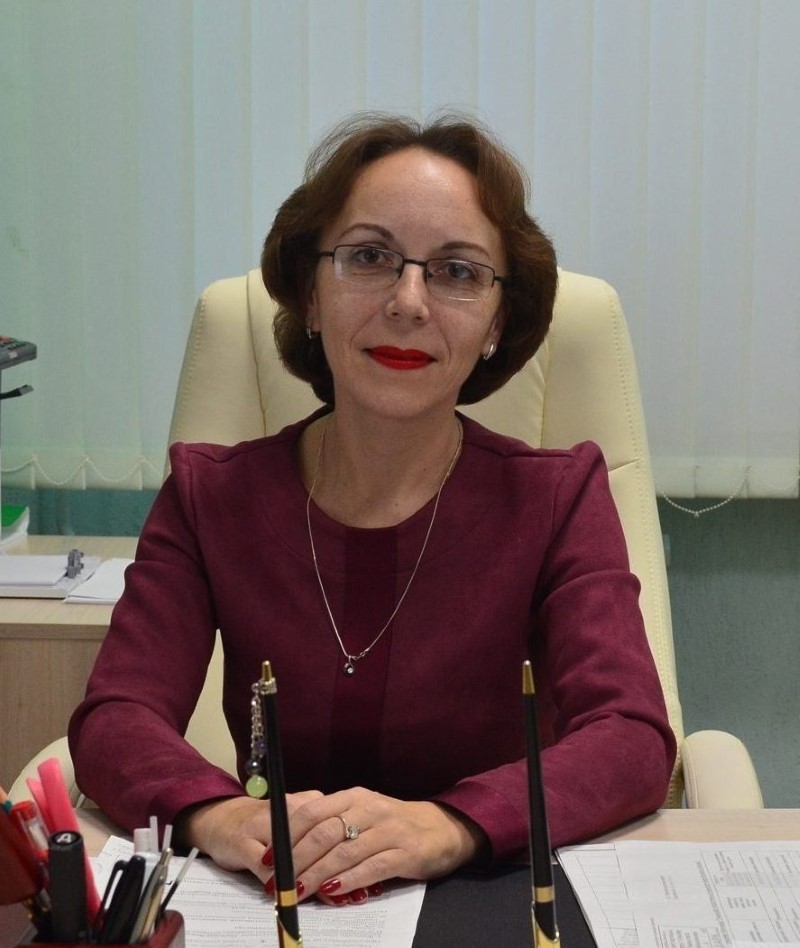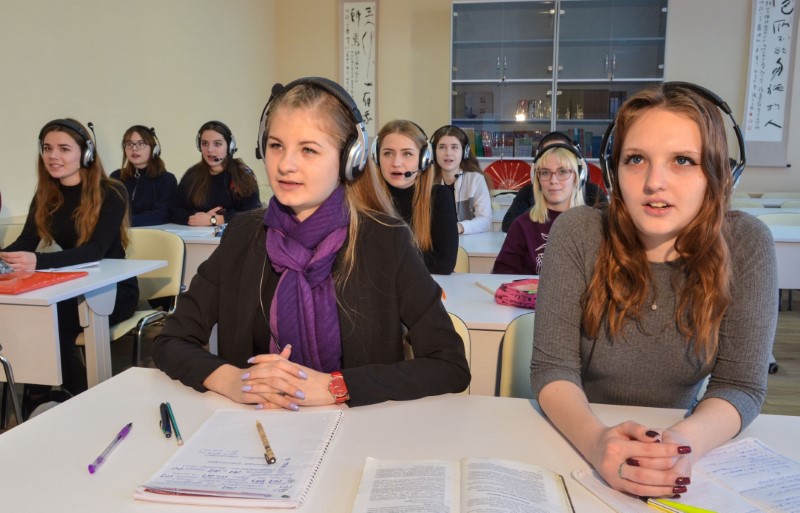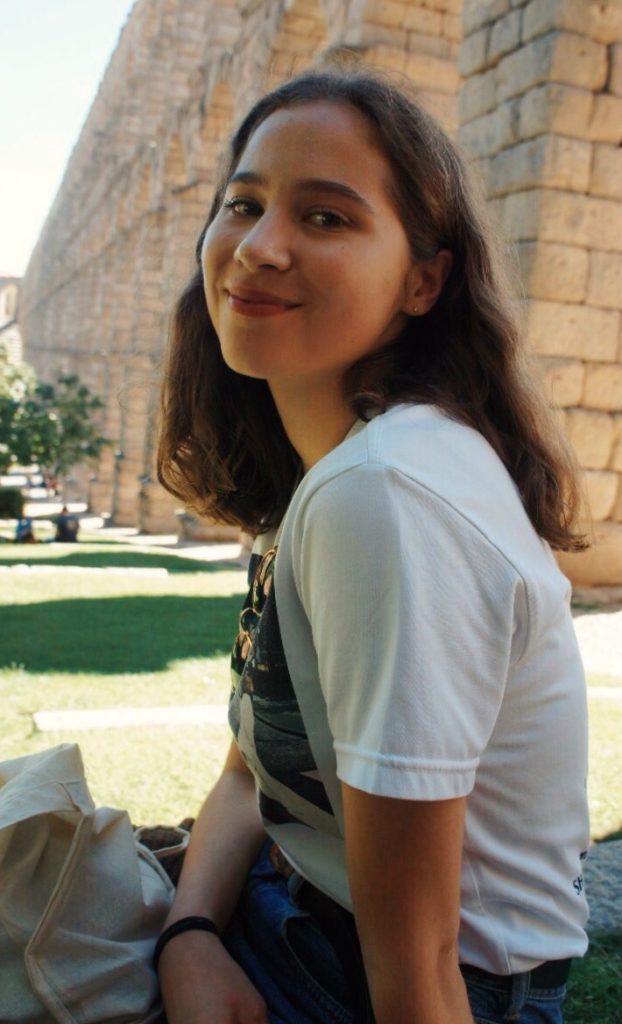“The main thing in life is to set clear goals and take firm steps to achieve them!” Elena Sazhina, dean of the Faculty of Foreign Languages at the Francisk Skorina Gomel State University, believes. Elena Vladimirovna is sure that the quality of training of foreign language teachers in the regional institution is not inferior to the capital.
- Elena Vladimirovna, what specialties are represented at the Faculty of Foreign Languages of the Frantsysk Skaryna State University?
- Full-time education is taught in two specialties and degrees of higher education: foreign languages (English, German; English, French) and foreign languages (German, English). Part-time students can study English in a five-year and four-year, abbreviated, program. The curriculum includes the teaching of a third foreign language - Spanish or Italian (at the student's choice). I would also like to note that in parallel you can study Chinese at the Confucius Institute, which operates successfully at GSU. A master's degree in "Theoretical and Applied Linguistics" has been opened.
- In your opinion, which young men and women become students of the Faculty of Foreign Languages?
- Our students are our diamonds, each of which we try to give an individual cut. The teachers work like real jewelers. And collectively, these diamonds are a chic necklace that sets them apart among all students. I can say that beauty, intelligence, purposefulness, creative talents (singing, drawing, dancing, etc.), decency, politeness, punctuality, organization, sociability - these are the main components of the image of our student.
- What are the prospects for graduates?
- When choosing a faculty of foreign languages, entrants sometimes do not even suspect what a wide range of perspectives opens up for them. The specialty indicated in their diploma is a teacher. Our stars become not only excellent teachers in universities, colleges, lyceums, schools, but also head educational institutions. And not only in Belarus, but also abroad - in Canada, Ireland, USA, Russia. The doors to the IT industry, business administration and translation are open to our graduates. They successfully work in EPAM Systems, IVA-Gomel, Anthology, Vizor Games, the Belarusian Chamber of Commerce and Industry, Belavia National Airlines, banks and international departments, foreign companies Katherein Solutions GmbH (Germany), ProMedia (USA) etc.
- Today it is impossible to imagine higher education without modern communication technologies…
- We have modern computer classes, language classrooms, audio and video libraries in foreign languages. Training is carried out within the framework of a personal communicative-oriented approach. Project methodology, collaborative learning, problem-solving assignments are used widely. Every year our teachers undergo advanced training. They regularly participate in international educational programs organized jointly with the German Academic Exchange Service (DAAD), the British non-profit online community Gallery Teachers, the Belarusian community Teaching English in Belarus, with the support of schools Atlantics (Ireland), KKLC (UK) and IBA Institute (Minsk).
- The practice of oral speech is of great importance in learning a foreign language. How is this side of learning organized?
- More than a thousand hours are allotted for the entire course of oral and written language practice. We should not forget about the importance of such subjects as practical phonetics, practical grammar, listening, analysis of written text, the basics of written speech, without which it is impossible to imagine the training of a highly qualified specialist. I can definitely say that students are completely immersed in the language environment. No less important is the possibility of regular communication with native speakers who give lectures and conduct seminars. Classes are traditionally held with representatives of the German Academic Exchange Service (DAAD), professors from Sam Houston University (USA). The main thing is to remember that language, like music, needs to be studied constantly and improved, without stopping for a second.
Sviatslau AKSYONCHYKAU-BIRUKOV, undergraduate: “Since childhood I have been interested in cultures of different nations, and especially attracted by foreign languages, because the culture of other nation, its soul can best be understood through language. Interest was fueled by my father, who travels around the world and talks about other countries, their customs, shows photos from there. So I had a desire to travel, and I decided to study English and French in depth at the Faculty of Foreign Languages of the Francisk Skorina State University. And when I found out that Chinese language courses are held at our university, I immediately signed up there! How could you miss such a chance - to touch the culture of the Celestial Empire! Later, at the Republican Olympiad in Chinese, in our Gomel team, I met Angelina, my future wife, a philologist. Since then, we have been constantly helping each other to develop in teaching and research. ”
- Knowledge of a foreign language blurs the borders between countries and opens the whole world to a person. Please tell us about international academic exchange programs.
- Indeed, the whole world is open to our students. Active cooperation with partner universities abroad has allowed to intensify academic exchange programs in recent years. Our students can take short-term (1-2 weeks) and semester internships at Sam Houston University (USA), Valladolid University (Spain), Novi Sad University (Serbia), Moscow State Regional University, Moscow City Pedagogical University, Pushkin Leningrad State Pedagogical University, Gumilev Eurasian National University (Kazakhstan), Georg von Langen School (Germany). An agreement has been reached with the leadership of the Moscow City Pedagogical University on the organization of a distance course in foreign languages, which will be taught by professors and associate professors of both universities. Upon completion of the course, students will receive certificates.
- In your opinion, is it necessary to go to the capital for higher education? How can a regional university attract applicants?
- Answering this question, I can give a personal example. In 1995, after graduating from school, I had a choice and a 100 percent chance to enter both the Minsk State Linguistic University and the Francisk Skorina Gomel State University. I had a long painful choice. The words of my godfather, which I still remember and which have not lost their relevance over the years, became key in the decision-making: “It doesn't matter if it is a capital institution or a regional one, the main thing is to have your head upon your shoulders and become a highly qualified specialist, learn not only to apply, but also to improve your knowledge, no matter where you end up. The second reason for my decision was pragmatism. If you're at home, then the walls help. And if there is peace and comfort in these walls, it smells delicious cutlets, borscht and cakes cooked by mom, you have a lot of time to study with the possibility of self-development and self-realization. Especially now that with the development of telecommunications technology, the boundaries are blurring: sitting in Gomel in front of a computer, you can work for any company, firm or institution around the world.
Anisia SEUDALEVA, student: “Studying at the faculty is diverse and interesting, we have very good relations with many teachers. I also remember an internship at the University of Valladolid in Spain. In general, student exchange is a very pleasant and unique experience that can be acquired at GSU. Valladolid is rich in historical treasures, museums, parks. Every day I went to classes with the thought that I would learn something new that I would later be able to use in my professional activities. Training in Europe is focused on group work and practice, so it was not boring even at lectures. Almost all classes in my specialty were held in English, with the exception of subjects directly related to the study of Spanish. And this is another pleasant aspect of a long stay in another country - the opportunity to learn several languages at once.
Speaking about the benefits of studying at a regional university, I would like to add that the small number of students in the course allows you to individualize the learning process, attract young people to various educational programs at the university, regional and international levels. For us, each student is a person with whom professionals work and offer different areas of further development of abilities and personal qualities. Our student is never lost in the crowd, I know everyone and try to offer the most acceptable options for his improvement. I also consider the high demand for graduates of our faculty not only in the Gomel region, but also abroad to be important. This is confirmed by numerous applications not only from educational institutions, but also from IT companies, private businesses, that need translators.
- Elena Vladimirovna, what does the Faculty of Foreign Languages of Gomel State University mean to you personally?
- For me, the Faculty of Foreign Languages is more than just a job. It is an integral part of my life and my soul. I feel pride and joy investing my soul in the development of my native faculty. It is a real happiness to watch the development of a child who was born in the depths of the Faculty of Philology in 1993 and became independent in 1998. Save and multiply - that's my motto. The whole faculty - students and teachers - is one family, and when there is understanding, comfort and peace in the family, it is very nice. And I stand firmly on guard for family happiness.
Ekaterina KAVALENKO spoke. Photo by the author and Vladimir CHISTIK.














